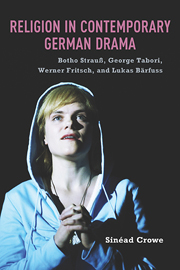 Religion in Contemporary German Drama
Religion in Contemporary German Drama Book contents
- Frontmatter
- Contents
- Acknowledgments
- Introduction: Definitions and Themes
- 1 The Relationship between Theater and Religion
- 2 Religion in Modern European Theater and Drama
- 3 “No One Wants to Get to God Anymore”? Botho Strauß's Groß und klein and Die eine und die andere
- 4 Theological Farce: George Tabori's Mein Kampf
- 5 “The Last Refuge for Metaphysics”: Werner Fritsch's Theater Theory
- 6 “The Feeling of Faith”: Fritsch's Wondreber Totentanz and Aller Seelen
- 7 Belief and Unbelief in the Twenty-First Century: Lukas Bärfuss's Der Bus (Das Zeug einer Heiligen)
- Conclusion
- Bibliography
- Index
5 - “The Last Refuge for Metaphysics”: Werner Fritsch's Theater Theory
Published online by Cambridge University Press: 05 May 2013
- Frontmatter
- Contents
- Acknowledgments
- Introduction: Definitions and Themes
- 1 The Relationship between Theater and Religion
- 2 Religion in Modern European Theater and Drama
- 3 “No One Wants to Get to God Anymore”? Botho Strauß's Groß und klein and Die eine und die andere
- 4 Theological Farce: George Tabori's Mein Kampf
- 5 “The Last Refuge for Metaphysics”: Werner Fritsch's Theater Theory
- 6 “The Feeling of Faith”: Fritsch's Wondreber Totentanz and Aller Seelen
- 7 Belief and Unbelief in the Twenty-First Century: Lukas Bärfuss's Der Bus (Das Zeug einer Heiligen)
- Conclusion
- Bibliography
- Index
Summary
WERNER FRITSCH'S THEORETICAL and programmatic writings repeatedly refer to religion in their attempts to redefine theater's potential in the late capitalist, virtual age. For example, they highlight the performative affinities between theater and religion, affirming the old notion that these two dimensions of human activity are closely related. One of these texts declares that contemporary theater's task is to fill the metaphysical vacuum that has been left by the decline of organized religion. Elsewhere, theater's ethical significance is compared to that of the Last Judgment. But despite the fact that religion appears to be a major source of inspiration for Fritsch's theatrical project, the secondary literature has barely attended to the theme. Instead, criticism has focused on two areas: Fritsch's treatment of the National Socialist period as it was experienced in the rural Bavarian region where he himself was born and brought up, and the distinctive language of his theater, which renders the earthiness of German dialect into a highly allusive and lyrical style.
In this chapter I analyze the place and significance of religion in Fritsch's programmatic texts. My main aim is to assess whether the key objectives and strategies of his theatrical project as a whole really are defined by religion, or whether in fact religious allusions perform a more superficial, rhetorical role. I begin in the first section by discussing Fritsch's cultural pessimism and his utopian redefinition of theater as the last refuge for metaphysics in the putatively secular Western world.
- Type
- Chapter
- Information
- Religion in Contemporary German DramaBotho Strauß, George Tabori, Werner Fritsch, and Lukas Bärfuss, pp. 91 - 106Publisher: Boydell & BrewerPrint publication year: 2013
